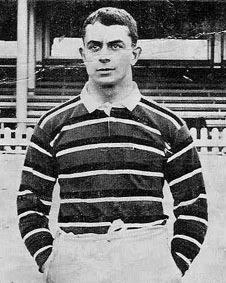Other Information

Former Scottish Rugby Football International. His brother John was also capped for Scotland. Adding to his reputation as the toughest rugby forward of his day, in 1909 he became Scottish heavyweight boxing champion.
“When I go on to that field I only see the ball,” the Rugby Football Internationals’ Roll of Honour quoted him as saying, “and should someone be in the road, that is his own lookout.”
His boxing style was based on raw punching power rather than technique, and his reputation was such that no policeman felt like intervening when he blocked Princes Street for an hour while lying down on the tram rails to celebrate a famous victory. When he got up, he went to a cab rank and reportedly tackled a horse.
Nicknamed “Darkie”, supposedly because of dark rings under his eyes. He attended Fettes College, where he learned rugby and eventually was in the XV. In 1899 he entered Trinity College, Cambridge, intending to read Law. He earned four Blues and played in the Varsity Match. He was first selected for Scotland in 1900 (aged 19) in a match against Wales.
After playing in all of Scotland’s Home Nations Championship matches in 1901, 1902 and 1903, Bedell-Sivright toured with the British Isles – now known as the British and Irish Lions – side that toured South Africa in 1903. After playing the first 12 matches of the tour, he was injured and so did not play in any of the test matches against South Africa. The next year he was appointed captain for the British Isles team that toured Australia and New Zealand. Due to a broken leg he played only one test match during the tour – against Australia – but was involved in a notable incident during a non-test match. Despite not playing, Bedell-Sivright pulled the British team from the field for 20 minutes after disputing the decision by a local referee to send-off one of their players. Bedell-Sivright eventually allowed his side to resume play, but without their ejected team-mate.
After his second tour, he spent a year stock-rearing in Australia before returning to the UK, having asked himself: “What was I, with an average amount of brains and rather more of money, doing? Simply prostituting the one in order to increase the other. It wasn’t good enough.” He entered Edinburgh University to read Medicine.
From 1905-9 he played for Edinburgh University, and as he was Captain of the XV for two seasons, thus he enjoyed the rare distinction of having been Captain of two University fifteens. When he retired from the game, he had been capped for Scotland 22 times.
Bedell-Sivright joined the Royal Navy on 25 January, 1915; trained at Royal Naval Hospital, Haslar, and at Royal Naval Division camp at Blandford, before proceeding with the Hawke Battalion, Royal Naval Division to the Dardanelles in April 1915. He was loaned to the Royal Scots Fusiliers from 8 to 20 June, and was then posted to the Portsmouth Battalion of Royal Marine Light Infantry.
About this time he wrote to a former boxing opponent, “It makes me swear that I am a medico. I’d be ten times more useful with a parcel of jam-tin bombs and a few Turks in front of me, than as a sort of qualified vet”.
After a period onshore in the trenches while serving at an advanced dressing station, he was bitten by an unidentified insect.
He complained of being fatigued and was taken offshore and transferred to the hospital ship HMHS Dunluce Castle. Two days later, on 5 September, he died of acute septicaemia and was buried at sea off Cape Helles.
In 1925 Northcliff was occupied by the Mathewson family; they lost their son William in the Second World War.

